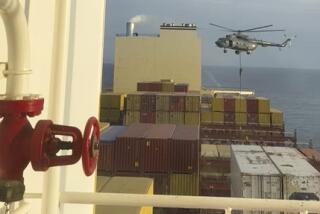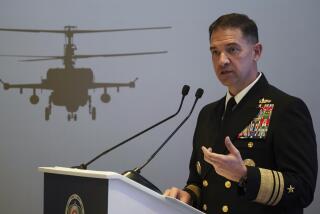Coast Guard Plays Key Role in Blocking Iraqi Supplies : Sea patrol: 46 Americans adapt their drug-busting tactics to gulf ship-boarding operations.
- Share via
MANAMA, Bahrain — U.S. Coast Guardsmen, veterans of drug-busting boarding parties off American shores, have become point men in the blockade of Iraqi supplies.
Forty-six guardsmen arrived in the region a week ago and have been assigned to U.S. warships patrolling the Persian Gulf, the Red Sea and the Gulf of Oman. It’s a different scene, with larger ships, but the tactics are the same.
“This is like hanging out with the biggest kid on the block,” said Lt. Jeff Fay, describing boarding operations on suspect shipping in blockade waters. The 36-year-old New Yorker said a Navy warship provides a “persuasive presence” when it comes alongside a freighter for boarding.
“It’s easier than drug duty,” Fay said, noting the Coast Guard’s experience in overhauling ships attempting to reach American shores with a load of cocaine from Colombia. Drug-runners from Colombia work the wide-open seas of the Pacific and Atlantic oceans and the Caribbean Sea. Shipping headed for Iraqi or Kuwaiti ports at the top of the Persian Gulf, or the Jordanian port of Aqaba, have to pass through narrow straits.
“We just sit there (in the straits) and say, ‘Oops, here they co” Fay explained during a break in the wardroom of the La Salle, command ship of the Navy’s Middle East Task Force. Coast guardsmen said no boardings have yet taken place within the Persian Gulf.
The guardsmen have been broken into 10 four-man teams, each assigned to American warships. Six others are posted to the command staff.
Pentagon spokesman Pete Williams said Friday in Washington that U.S. ships have challenged about 250 merchant vessels in the last week in enforcing the U.N.-mandated blockade of supplies bound for Iraq and occupied Kuwait. He said fewer than 10 have been boarded so far.
Fay said the boarded ships were flying the flags of Sri Lanka, Kuwait and India among other countries.
The procedure is routine. A ship is hailed and asked its cargo and destination. Persian Gulf ships were challenging 30 to 40 merchant vessels a week, Fay said.
If the naval commander doubts the response from the ship’s master, a boarding party is dispatched. It can include both guardsmen and sailors.
“It depends on what he tells us,” Fay explained. “If it’s suspect, we go aboard, check the manifest, the cargo, the charts.” The decision to board is made by the warship’s skipper in coordination with higher command. But Fay and other Coast Guard officers say the skippers have on-the-spot authority. “A captain on these ships gets paid good money to do his job,” Fay explained. “They (higher commanders) have tried not to micro-manage it too much.”
Lt. Al Crespo, a Californian who has been assigned to Coast Guard drug duty out of Miami for the past six years, said: “In Miami our job is to enforce U.S. law. Out here we’re enforcing U.N. resolutions which are U.S. policy.” Technically, the guardsmen are assigned to units called Law Enforcement Detachments.
Crespo, called to Persian Gulf duty on two hours’ notice two weeks ago, related the story of a New Orleans based-guardsman who received the call while his wife was out grocery shopping. He left her a note.
Neither Crespo or Fay reported resistance from boarded ships. Nor had they met resistance from drug-runners halfway around the world in Western Hemisphere waters. “The captains of the drug-runners just tell you to come aboard and hope you won’t find anything,” Crespo explained. Merchant skippers in these waters, he said, “are no more likely to shoot than the druggies” when faced with an armed boarding party backed up by a warship.
He did not describe boarding procedures aboard the American ships, but British naval officers said their parties would use ship-based helicopters to ferry six-man teams of Royal Marines to suspect ships. Armed with submachine guns and stun grenades, the marines would descend by ropes to the bridge of the ship, the officers said.
Use of inflatable boats was ruled out because big ships, particularly tankers, ride too high in the water for a quick ascent.
Both British and American naval officers said they are confident that no large amounts of supplies could run the sea blockade. “Some small boats might get through,” Crespo said, “but they’d have to use a lot of them to make any impact at all.”
More to Read
Sign up for Essential California
The most important California stories and recommendations in your inbox every morning.
You may occasionally receive promotional content from the Los Angeles Times.













